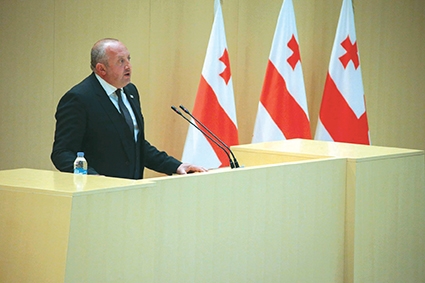GD Majority Slams President's Annual Parliamentary Address
The ruling Georgian Dream (GD) party harshly criticized President Giorgi Margvelashvili’s annual address in Parliament, delivered on May 2, claiming it lacked “in-depth analysis” and was mainly focused on hitting out at the government rather than on the progress achieved in many fields.
It was Margvelashvili’s last annual address, as his term expires with the presidential elections scheduled for October.
Georgia’s Prime Minister, Giorgi Kvirikashvili, who attended the President’s speech along with some members of the Cabinet, stated he had had greater expectations from Margvelashvili.
“I personally expected the President's last speech in this capacity to be more in-depth and analytical; better focused, with more problem-analysis and ways to solve issues being faced. He did speak about the country's social situation and problems, which we do not deny. On the contrary, every branch of government is working toward advancing the country in this regard,” Kvirikashvili stated, adding that the President should have portrayed a broader picture of the problematic issues in the country, and should have underscored the unifying function of the presidency as an institution.
Archil Talakvadze, the leader of the parliamentary majority, said that the President’s speech was a short and “superficial” report. According to him, the speech lacked the country's defense capabilities, economic development, Archil Tatunashvili's case and other important issues.
“The report missed out a number of very important issues. We heard nothing about Georgia's defense capabilities or our soldiers protecting Georgia's security in Georgia and international missions. He said nothing of his assessment of Georgia's strategic cooperation with the US and the EU, or the prospects for EU integration,” he added.
The leader of the GD faction, Mamuka Mdinaradze, was more critical than the PM or Talakvadze, directly accusing Margvelashvili of pardoning too many convicts.
“About 70-80% of the convicts pardoned by you had been convicted for serious crimes… All Presidents of independent Estonia have pardoned ten times fewer than you did in 2017 alone,” he told the President.
During his 23-minute speech, Margvelashvili focused on the work carried out by the ruling party, saying that GD had “failed to fulfill its main tasks” and had “deliberately” weakened state institutions and democracy.
“We have achieved significant progress in many directions since coming to power in 2012. The state is no longer an aggressor, but unfortunately we have weakened institutions and failed to establish a more democratic system,” the President said.
He also noted that journalists are having to work in tense situations.
“After 2012, the media environment indeed became free and journalists are not under attack any more, but some kind of non-violent difficulties are still created against them. Ask any representative of the media - they have to work in a tense situation and constantly expect obstacles," he added.
Margvelashvili also focused on the economic situation in the country, saying business is free today but small and medium businesses are “over-shadowed” by big businesses.
“I welcome the promotion of start-ups and innovations, but the goal of social equality has unfortunately not been achieved,” he stressed, adding that unemployment is one of the most serious problems for Georgia.
In his speech, the President stated that no steps have been taken to strengthen the political opposition.
"The 2016 election was a deliberate attempt to destroy a political class, a deliberate attempt to weaken political parties as major players in the political space,” he said.
After the address, Margvelashvili attended the legislators’ speeches but was not allowed to participate in the debates.
The President then called on the MPs to allow him to respond to their questions, and said he would leave the chamber unless they did so. This was followed by criticism from the Parliament Speaker, Irakli Kobakhidze, who said the President disrespected parliament and its regulations.
After the parliamentary opposition parties also requested the President’s involvement in debates, the Speaker put the issue to a vote. Only 28 MPs voted for the changes, with 50 MPS against.
After Parliament adopted a decision that no amendments would be made to the regulations to allow the President to be involved in the debate, Margvelashvili left the Parliament building.
Opposition parties which voted in favor of the participation of the President in debates also left the session in protest.
By Thea Morrison












